- Essay Topic Generator
- Summary Generator
- Thesis Maker Academic
- Sentence Rephraser
- Read My Paper
- Hypothesis Generator
- Cover Page Generator
- Text Compactor
- Essay Scrambler
- Essay Plagiarism Checker
- Hook Generator
- AI Writing Checker
- Notes Maker
- Overnight Essay Writing
- Topic Ideas
- Writing Tips
- Essay Writing (by Genre)
- Essay Writing (by Topic)

8th Grade Essay: Examples, Topics, & Writing Tips

If you find yourself on this page, you are probably going to another level of your education – the final year of Middle school!
Isn’t it exciting?
One of the most common assignments in the 8th grade is an essay. Indeed, it gains new features. An eighth-grade essay is not the same as the sixth or seventh-grade one. It has more requirements and needs a deeper level of analysis.
How to write an 8th-grade essay? How many paragraphs should it contain? What is a standard 8th-grade essay format? On this page, you’ll find the answers to these and other questions that might arise. We’ve prepared creative 8th-grade essay topics, examples, and tips to write an A+ informative, narrative, or persuasive essay.
- 🧩 8th Grade Essay 101
- 📑 8th-Grade Essay Types
- 💾 Topics for the 8 th -Graders
🍎 8th Grade Essay Examples
🧩 8th-grade essay format explained.
Once again: the 8th-grade essay format is a bit different from that of the previous years.
Below, we thoroughly explain how long an 8th-grade essay should be and how to write it. We guarantee you’ll have no questions about the format and assessment of this type of work.
What Is the 8 th Grade Essay Format?
In this section, you’ll know which parts comprise any 8th-grade essay.
The first thing to remember: you’ve got onto an entirely new level. So, your writing isn’t as simple and short as it used to be in the previous school years.
Let’s start with the structure. The fundamental parts are the same as in any type of essay:

8th Grade Essay: How to Write & Typical Mistakes
With the help of this section, you’ll get to know the most straightforward and helpful tips for 8th-grade essay writing.
These are the things that any 8th grader should know!
8 th Grade Essay Do’s
- Look for reliable sources to find arguments and evidence.
- Try to arouse eagerness for writing: it surely will ease the whole process for you.
- Choose the topic that is interesting for you if you have such an option.
- Use academic language, special terms, consistent phrases, and correct grammar.
- Use good quotations from reputable sources to solidify your ideas.
8 th Grade Essay Don’ts
- Don’t write dully: an essay is a story. It should be exciting and consistent.
- Don’t make all your examples too similar: diversity is of the essence.
- Don’t let your text look like an unreadable pile of words: use graphic tools to highlight the most critical points.
- Don’t use unreliable sources and websites for citation.
- Don’t be afraid of honest self-expression. Your identity and thoughts are what make your 8th-grade essay unique.
- Don’t forget to revise your text after you’ve finished writing it.
8th Grade Essay Rubric
Meet the assessment strategies for 8th-grade writing. Here you’ll also find some prompts that improve your essay and lead you to a higher score.
So, the assessment pattern of a written piece comprises several main points. These are the things that assessors pay attention to:
📑 Eighth Grade Essay Types
We suppose that you come across different types of assignments during middle school. Among them, there indeed were descriptive and narrative essays.
However, now you are to face other exciting formats of writing. In the section below, you’ll get to know a few new types.
8th Grade Argumentative Essay
An argumentative essay is a piece of writing where you make a claim and prove your point of view with solid arguments. Your aim at this point is to make readers nod in contempt while reading and share your opinion.
The structure may be pretty familiar to you:
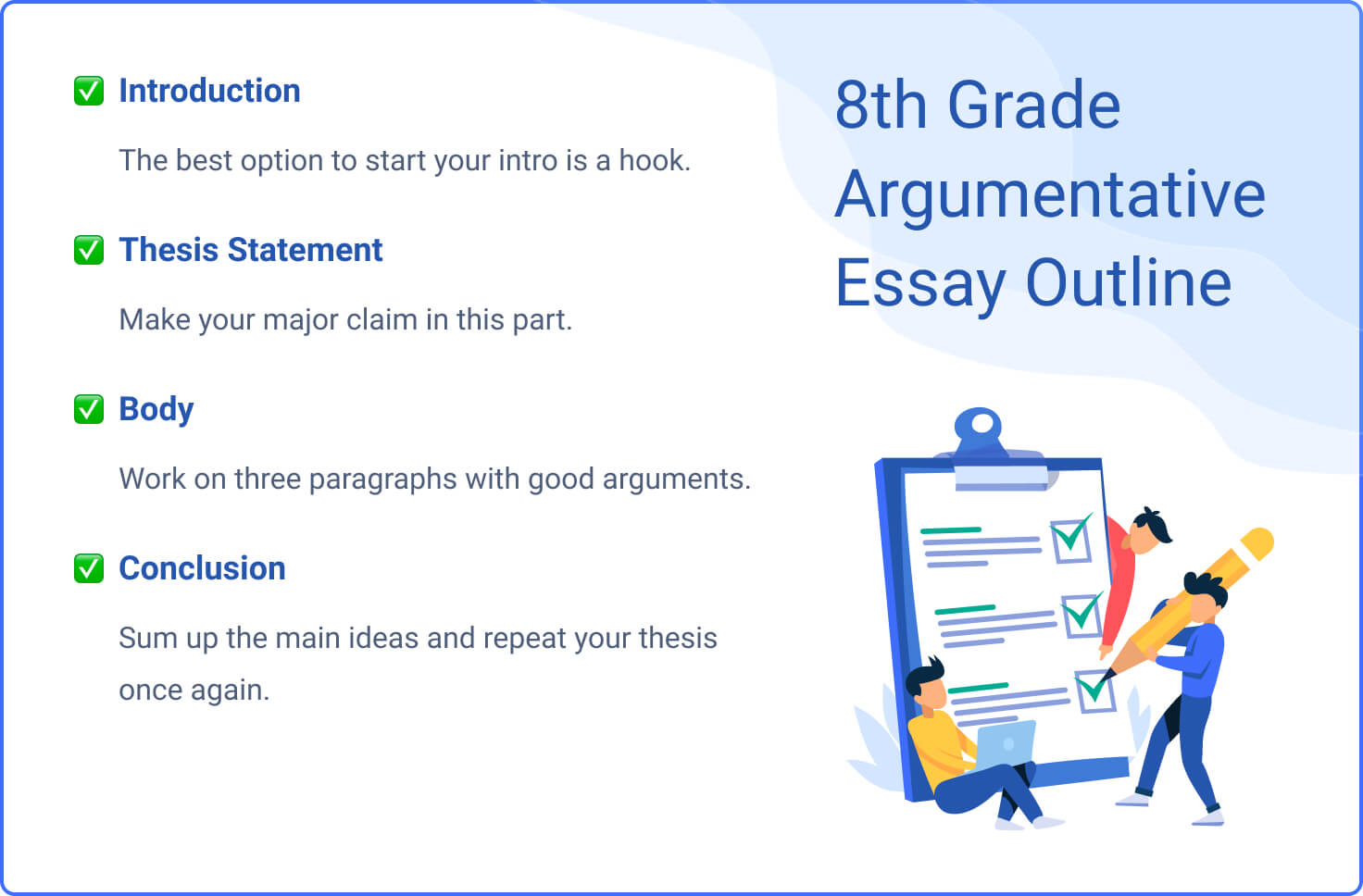
In your argumentative essay, you should back up your opinion with some exact data: statistics, figures, research studies, and polls.
To solidify your claim, you can use three types of arguments:
- Aristotelian . The classical way – you make a statement and try to persuade the audience that it is the one that is fair and right.
- Rogerian . First, you display an issue, then present the opposing view. After that, reveal your own opinion and start convincing readers why they should take up your point.
- Toulmin . Present your thesis statement, then provide the audience with the grounds to support it. The final touch is to connect these parts.
PRO TIP: Explain why you disagree with the opposing point of view on your issue.
8th Grade Persuasive Essay
A persuasive essay is very similar to argumentative writing. There you have to pick up a mainly burning issue and establish a firm opinion towards it. The primary goal is the same as in the argumentative essay: to make your readers believe you.
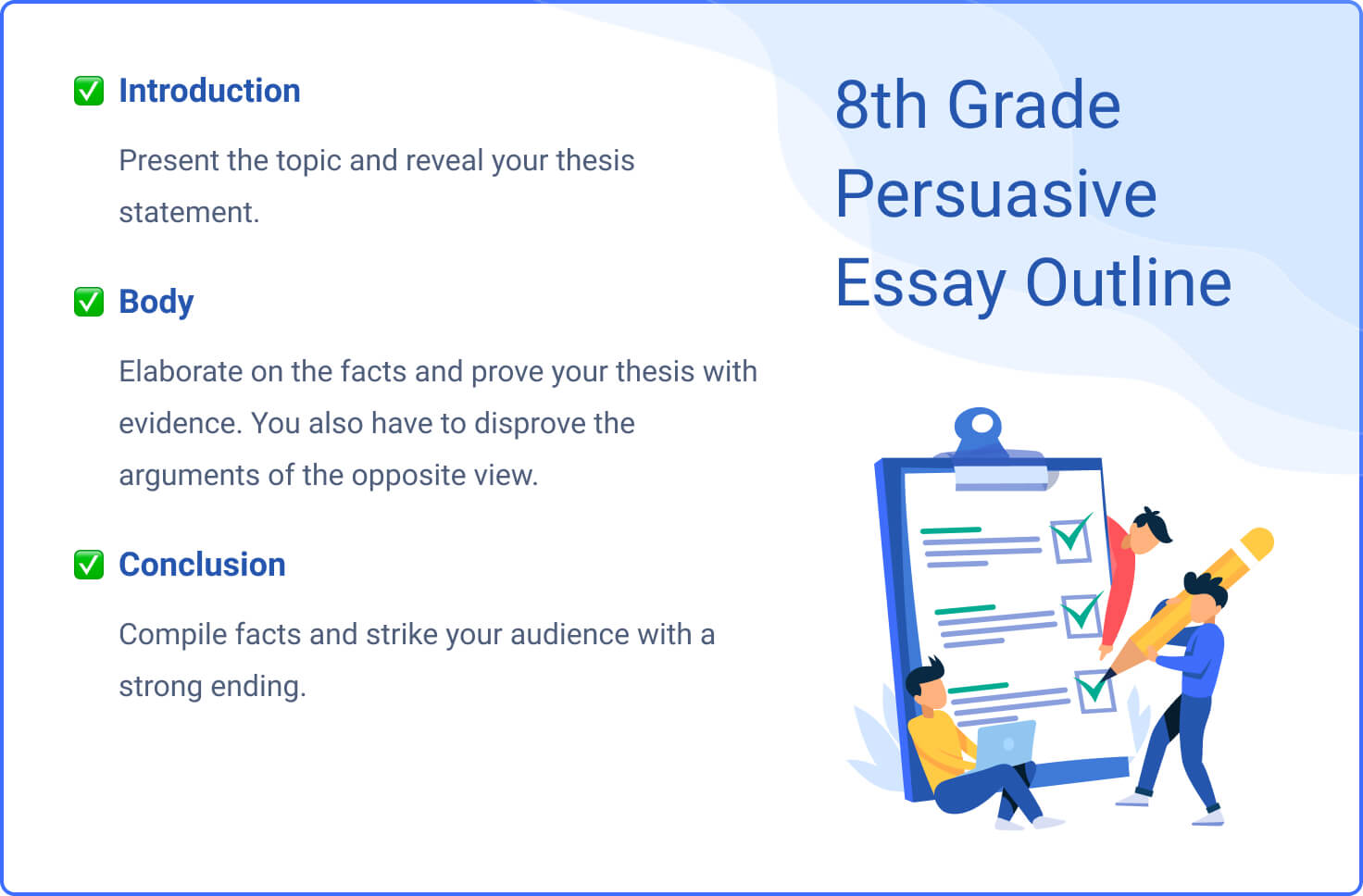
Remember the three essentials of persuasive writing:
- Logos appeals to logic, which is apparent. Deliver your thoughts cohesively and reasonably.
- Ethos is about persuading the readers, appealing to their sense of ethics and morality.
- Pathos helps you convince through emotions.
8th Grade Essay – Informative
An expository essay brings concepts to complete understanding. In other words, you explain something to give a clue about the subject in question. Successful expository writing makes the audience get the whole picture, leaving no questions or misunderstandings.
To familiarize yourself with expository essay structure, check our recently updated guide on writing an expository essay .
And briefly look at six major types of expository essays:
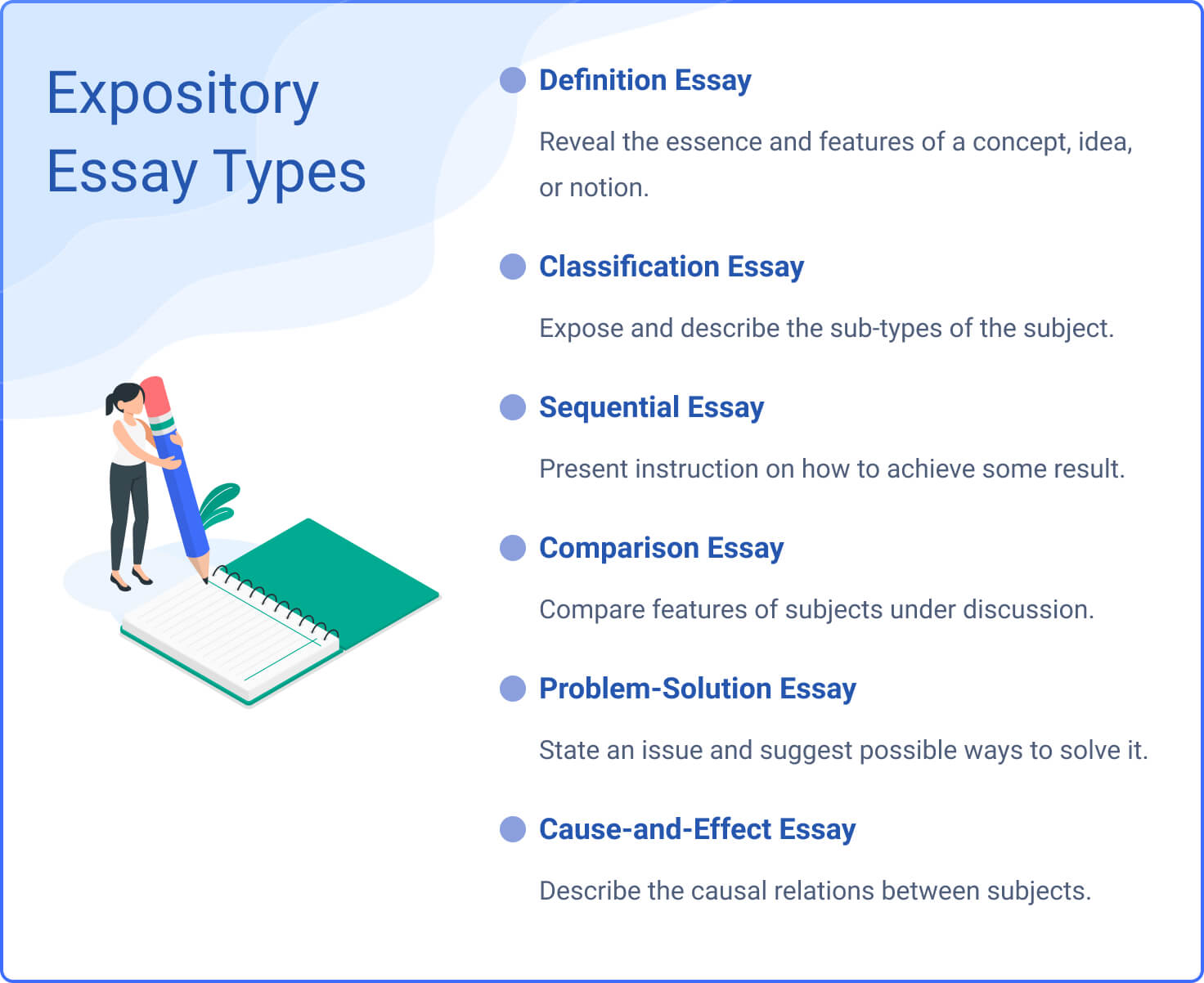
💾 8th Grade Essay Topics
8th grade argumentative essay topics.
- What is the main challenge you’ve ever met?
- What was the happiest moment of your childhood?
- Tell about the accomplishment you’re most proud of.
- What are the personal qualities you like most?
- Write about an inspiring celebrity.
- What does emotional intelligence mean?
- Write about the largest challenge of getting older.
- How is adolescence different from childhood?
Read the list of topics we’ve prepared for an 8th-grade essay. Choose your favorite or use our Free Essay Topics Generator to find the best one.
Persuasive Essay Topics for 8th Grade
- Would limited screen time be beneficial for health?
- Will the global use of electric vehicles save us from the ecological crisis?
- The government should provide citizens with more qualified psychological help.
- What are the pros and cons of buying a pet for a child?
- Should people use paper and textile bags instead of plastic ones?
- Is it necessary to attend PE classes in school?
- Is it ethical to use smartphones during the lesson?
- Should parents forbid their children from watching TikTok?
- Pros and cons of cheating on exams: immoral or beneficial?
- Should there be only healthy snack vending machines at schools?
- Is it acceptable for a teacher to raise the voice at a student?
- Should modern rappers’ songs be put through censorship?
- Is it ethical for students to discuss their teachers?
- Should all cosmetic products become cruelty-free?
- Should we stop the overconsumption of sugar for the sake of our health?
- Should zoos and circuses be banned forever?
8th Grade Informative Essay Topics
- Compare and contrast the environmental policies of the USA and Europe.
- What are the harmful effects of CO 2 emissions on the environment?
- How is the concept of freedom reflected in 20th-century literature?
- Reveal the details of the famous friendship of Hemingway and Fitzgerald.
- Brush off or fight: how to act when you come across bullying at school?
- What are the most significant challenges school attendees usually face?
- How to overcome your fears without getting traumatized?
- How to prepare for the exam period and overcome anxiety?
- Freedom or despair: the history and concept of trailer parks in the USA.
- Explain the concept of sustainability and what benefits it has.
- Provide a classification of American lifestyles based on location.
- A reasonable person: describe the concept and the features.
Look at our 8th grade essay examples. These are mostly just excerpts, but we included the most significant parts. Approach us in case you need a similar paper or have any questions.
8th Grade Argumentative Essay Example (#1)
The most notorious substance in the ecological discourse: is CO 2 really that bad?
Did you know that it’s better for the earth if you work out or jog with your mouth tightly shut? It’s not common knowledge, but professionals know: we need a considerable amount of CO 2 in our blood. In some terms, it’s even more vital than oxygen. Undoubtedly, there has to be a proper balance, and here is the point: CO 2 can be beneficial.
Though what good does it make to nature and the environment?
It’s all the same as with our body: CO 2 is not evil on earth, but there must be a proper balance. Now, this balance is critical, and we must make serious efforts to change the situation.
- According to last year’s research, the USA is in the second place among countries producing the most significant part of CO 2 in the whole world. The website statista.com published striking figures. 4.57 million metric tons of carbon dioxide emissions were produced in 2020 by the energy consumption sphere in the United States.
- Besides, a recently published report from the IEA agency reveals another piece of statistics. Compared to the previous year, the amount of CO 2 emissions will rise to 5% in 2021. This year we’re facing 33 billion tons of this greenhouse gas.
- These figures mean nothing without context. Here you are: nature suffers greatly from CO 2 influence. Due to the greenhouse effect caused by an excess of CO 2 , the water temperature in oceans and seas is rising. This process is not positive at all because the natural habitat for sea creatures is altering. The changes are dramatic and lead to the extinction of many species.
In conclusion, we need to find an efficient way to improve the ecological situation regarding CO 2 emissions. The key is global social and individual awareness and consciousness. Each and every inhabitant of the Earth has to understand the meaning of CO 2 for global warming clearly. So, try to jog with your lips closed and choose a bike instead of a car.
Example #2: 8th Grade Persuasive Essay
Is it essential to stay away from social media for the sake of mental health?
Nielsen Company conducted research that says that the average US adult spends more than 10 hours interacting with social media each day. Indeed, social media plays a very considerable role in the life of a modern person. Most of us are more likely to spend time watching short videos than reading a good book. But is it harmful to our mental health to the extent that we have to quit using social media platforms?
To my mind, we are greatly dependent on our Instagram and TikTok accounts, and the content posted there. It certainly has a negative impact, too. However, the complete cancellation of social media is not a way out. The key to good mental condition is in the skill of managing your relations with them.
- One of the recent surveys by the Lancet reports that Facebook users who scroll the newsfeed before sleep tend to be more depressed. Apparently, the deprivation of sleep affects mental well-being to a great extent.
- FInancesOnline has recently posted the results of the research. According to this data, Facebook constitutes 72% of people’s FOMO and anxiety. Posts about traveling and active social life create most of these feelings.
- At the same time, healthy rivalry can motivate development and growth. There’s a reasonable quotation saying that one should compare themselves yesterday instead of comparing to others. The best thing one can do to take care of their mental health is to take a digital detox for a while.
Thus, it is vital to trace your obsessions with social media and negative feelings caused by comparison with others on the Internet. Try to get more aware of it, take your time to rest from social media, and plunge into real life.
5 Paragraph Essay Example for 8th Grade (#3)
The Financier and American Tragedy : compare and contrast two main characters of Dreiser’s novels.
Do you know that Theodore Dreiser is sometimes called an American Fyodor Dostoevsky? Both writers touched upon the most sensitive social and existential issues. However, the subject of this paper is not the comparison of the authors but two famous Dreiser characters: Clyde Griffiths and Frank Cowperwood.
Both of these young American men were striving to reach financial and social success in a world of brutal struggle and hardships.
- Clyde Griffiths represents the desperate strive for American Dream. Born in a poor and religious family, he grows greedy for money and status. In his blind obsession with gaining a high social position, he doesn’t notice his spiritual degradation. He is smart enough to struggle his way into high society but not so witty to solidify his standing with decent means. He cheats, lies, and finally commits a murder: Clyde seems to be already born guilty at times. On reading the story, there doesn’t appear any sympathy toward him. On the contrary, he provokes feelings of abomination and disgust.
- Frank Cowperwood also aims to become wealthy and socially firm. He wants to improve his family’s life quality. Still, his ways and means astonish. Frank is a natural-born predator and strategist. His sophistication and sharp wit show up in him since his very childhood. He isn’t a man of high moral standards: Frank doesn’t mind cheating on his wife and manipulating city treasure money. However, he’s a passionate man, honest and open in his heart urges and impulses. That is the reason why fortune favors him.
However, having similar goals but different personalities and mindsets, Griffiths and Cowperwood reach completely different destination points.
How to Write an Essay in 8th Grade?
– You should pick up a good topic and formulate your attitude to the problem. – Write an outline. – Make a clear and brief thesis statement. – Think of at least 3 firm arguments if the essay type demands it. – Impress your readers with a firm conclusion. Voila! Do not forget to proofread!
How Long Is an Essay in 8th Grade?
The length of the 8th-grade essay slightly depends on the format and the particular type of writing. However, it varies from approximately 500 to 800 words. Within this framework, you have to make yourself clear and deliver all necessary points.
How Many Sentences Are in a Paragraph for 8th Grade?
The size of a paragraph in the 8th-grade essay has to be not less than 8 sentences in each. Besides that, mind that the sentences are primarily compound or complex, error-free, and coherent. Also, remember to connect the sentences and paragraphs with particular language means.
How to Write an Argumentative Essay in 8th Grade?
Choose an exciting and acute topic. Make up a thesis statement out of the problem. Draft an outline or a brief plan. Explore some reliable sources for the evidence and arguments for your essay. Organize the facts and information into a cohesive structure.
I’m an 8th grade student at a private school, and my teacher assigns us up to 4-6 pages most to write. First of all we get other essays on top of this, and usually have nearly to a week to finish. Me and my classmates struggle with this. Do you guys think this is too much for an average 8th grade student?
i am writin apaper right now and it is averreding and its about the changes we woud make to our cafeteria it has to be 5 paragraphs long
Thanks for stopping by at our blog. We would be happy to help you with your paper. You can be interested in some other posts on this blog (https://overnightessay.com/blog/category/essay-tips/) or contact our friendly Support Team to get professional writign help from experienced writers. Good luck with your paper! Best regards,

- Online Calculus Tutors
- Online Geometry Tutors
- Online Algebra Tutors
- Online Trigonometry Tutors
- Online Statistics Tutors
- Online Chemistry Tutors
- Online Macroeconomics Tutors
- Online English Tutors
- Online Physics Tutors
- Online Computer Science Tutors
- Online Accounting Tutors
- Online Biology Tutors
- Online Business Studies Tutors
- Online Finance Tutors
- Online Programming Tutors
- Online Management Tutors
- Online Science Tutors
- Year 2 Maths
- Year 3 Maths
- Year 4 Maths
- Year 5 Maths
- Year 6 Maths
- Year 2 English
- Year 3 English
- Year 4 English
- Year 5 English
- Year 6 English
- Year 7 Maths
- Year 8 Maths
- Year 9 Maths
- Year 10 Maths
- Year 10 Advance Maths
- Year 7 English
- Year 8 English
- Year 9 English
- Year 10 English
- Year 11 General Maths
- Year 11 Chemistry SA,NT
- Year 11 General Mathematics VIC
- Year 11 Mathematical Methods
- Year 11 Mathematics Standard
- Year 11 Chemistry ACT
- Year 11 Mathematics Extension 1
- Year 11 Mathematical Methods SA, NT
- Year 11 Mathematical Methods VIC
- Year 11 Mathematical Applications
- Year 11 Chemistry QLD
- Year 11 Literature ATAR
- Year 11 English - QLD
- Year 11 English Advanced NSW
- Year 11 EALD Level 3
- Year 11 English Language
- Year 11 Essential English M
- Year 11 Essential Skills TAS
- Year 11 Essential English
- Year 11 Bridging EAL
- Year 11 EALD Level 1
- Year 11 Stage 1 Essential English
- Year 11 English General
- Year 11 Mathematics Advanced
- Year 11 EAL
- Year 11 English Standard
- Year 11 EALD ATAR
- Year 12 Mathematics Standard
- Year 12 Further Mathematics
- Year 12 Mathematics Applications
- Year 12 Mathematics Extension 1
- Year 12 Mathematics Methods
- Year 12 Mathematics Advanced
- Year 12 Mathematics Methods VIC
- Year 12 Mathematics Methods - TAS
- Year 12 General Mathematics TAS
- Year 11 English T
- Year 12 Mathematical Methods - QLD
- Year 12 General Mathematics SA, NT
- Year 11 Foundation English
- Year 11 English Studies
- Year 11 Literacy Short Course
- Year 11 English Preliminary
- Year 12 English ATAR
- Year 11 EAL/D
- Year 12 English Extension 2
- Year 12 EAL/D
- Year 12 EALD ATAR WA
- Year 12 English Foundation
- Year 12 English Extension 1
- Year 12 Literature
- Year 12 Stage 2 Essential English
- Year 12 English Literature ATAR
- Year 12 Stage 2 English
- Year 12 EALD Level 2 - TAS
- Year 12 English Advanced NSW
- Year 12 Chemistry VIC
- Year 12 English Language
- Year 12 English Literature T - ACT
- Year 12 English Foundation WA
- Year 12 English Standard NSW Learning Programs
- Year 11 Chemistry WA
- Year 11 Chemistry - VIC
- Year 12 Chemistry - QLD
- Year 12 Chemistry - TAS
- Year 12 Chemistry - WA
- Year 12 Chemistry - NSW
- Year 12 Chemistry - ACT
- Online Tutors in Sydney
- Online Tutors in Melbourne
- Online Tutors in Brisbane
- Online Tutors in Gold Coast
- Online Tutors in Perth
- Online Tutors in Canberra
- Online Tutors in Adelaide
- Online Tutors in Newcastle
- HSC Papers 2019
- HSC Papers 2018
- HSC Papers 2017
Book a Free Demo
Math Calculus Geometry Algebra Trigonometry Statistics Chemistry Economics Macroeconomics English Physics Computer Science Accounting Biology Business Studies Finance Programming Management Science Year 3 Year 4 Year 5 Year 6 Year 7 Year 8 Year 9 Year 10 Year 11 Year 12 College
Search Here
Recent posts.
- General Achievement Test Australia
- ESL vs English Tutoring – What Makes Them Different?
- Know the Grading System in Australia
- GED vs HiSET: All You Need To Know
- HSPT vs PSAT: Which One Is Beneficial For You?
- WordPress.org
- Documentation
- Support Forums

65 Engaging 8th Grade Writing Prompts for Creative Essays
Creative writing is a discovery process, and 8th grade is a great time to encourage your students to find their voices. It’s the final grade before high school, and it’s a time when students are really discovering themselves and their place in the world as they leave middle school.
That’s why…
It’s so important to give your 8th-grade students writing prompts that will help them explore their thoughts and opinions. These 8th-grade writing prompts for creative essays are designed to do just that.
Journal Writing Prompts

Journaling is a great way to get your students’ creative juices flowing. It’s also a great way to get them thinking about their own thoughts and experiences. Here are some journal prompts to get your eighth graders started:
1. If you had the chance to travel anywhere in the world, where would you choose? What attracted you to that location?
2. Do people require a compelling reason to live? How would you characterize the purpose’s evolution over time?
3. Imagine you could go back in time and give someone advice. What would you say?
4. When it comes to writing, how do you feel? Consider something else in your life when comparing your feelings about writing to it.
5. Create a typical day in the life of an eighth-grader with a short story.
6. Write about your favorite movie or book. Why do you love it so much?
7. What do you like about your appearance?
8. Consider what you value in life and how it relates to where you want to be in five years. Make a personal vision statement for your life.
9. What are your thoughts on the notion of vulnerability? Have you ever been anxious when you’ve felt weak or exposed?
10. What are your biggest regrets so far in life? Why do you feel the way you do about it now?
11. Choose someone older, such as a grandparent. What is the most significant lesson you’ve learned from that individual?
Creative Writing Prompts
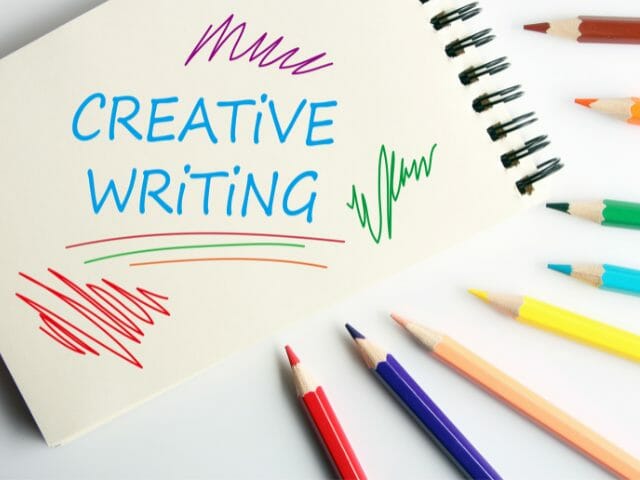
Creative writing is all about expressing yourself in your own unique way. That’s why it’s such a great activity for eighth-grade students. By allowing young writers to flex their creative muscles, they’ll be able to explore their thoughts in a way they might not have before.
Here are some creative writing prompts to get your 8th graders started:
12. If you had one opportunity to make a difference in the world, what would it be and why?
13. What would you change if you were in charge of your school and why?
14. If you had the power to transform your city’s appearance or structure, what would you do and why?
15. Who would you invite for dinner if you could choose any famous person?
16. Write a short story about what your life would be like if you lived in the cold deserts of Mongolia.
17. Your instructor has requested that you present a lesson with the fifth-graders. What will you speak about and why?
18. Name one thing you’d want to accomplish in the future. Describe why it is so essential for you and how you intend to achieve it.
19. “Don’t judge a book by its cover.” Have you ever heard that? What’s your take on it? To support your standpoint, utilize precise details and scenarios.
20. The town officials want you to create a community for the future. Share your vision using specific information and examples.
21. What would your brain be like if it were a physical location?
22. Write a scenario in which a usual family activity goes horribly wrong.
Expository Writing Prompts

Although similar to creative writing, expository writing is a different animal altogether. Here are some exciting prompts to get your middle-schoolers started:
23. What’s the most unusual location you’ve ever visited? Describe it in detail.
24. Tell us about your last birthday, from the moment you awoke until you went to bed that night.
25. Imagine your dream home. Make a list of each room and its features.
26. How do you get to your grandparents’ house or another family member home?
27. Write about your typical school lunch and your experience eating in the lunchroom.
28. Consider a career you’d like to have one day. Describe a typical working day in that position.
29. What unique characteristics do you possess as a member of this generation? How are people your parents’ or grandparents’ age different from yours?
30. What are three fun ways your family might spend a family vacation together?
31. Why do you think someone you know should be regarded as a leader?
32. Who’s your favorite teacher, and why?
33. If you had to be an animal, which one would you choose and why?
Precise Language Writing Prompts

When it comes to writing skills, precision is key. Your students need to communicate their thoughts and feelings clearly and concisely. That means they need to have a vast vocabulary and use it effectively. Here are writing prompts to help your students hone their skills:
34. Write a news article about a recent natural disaster.
35. Think about a time when you were extremely proud of yourself. Write a first-person account of your proudest moment.
36. What is your earliest memory of feeling fear? Write a brief story about that experience.
37. Are all teachers educators? Are all educators teachers? What is the difference between a teacher and an educator?
38. When should you say a specific number instead of “a lot” to avoid being mistaken?
39. What exactly makes something “made from natural components” distinct from anything grown in your backyard?
40. What is the difference between race and nationality?
41. What is the difference between music and sound?
42. What is the primary difference between being wise and being intelligent?
43. How can you tell the difference between an opinion and a fact?
44. Is it correct to refer to an 8th grader as a “young person”? Why or why not?
Counter-Argument Writing Prompts

To become better writers, students of this age group need to be able to anticipate and refute counter-arguments to their own claims. Here are some counter-argument writing prompts to get your reluctant writers thinking:
45. An old saying goes, “Early to bed, early to rise, makes a man healthy, wealthy, and wise.” Explain why this might not be true.
46. Some individuals believe that crying is a sign of weakness. Disabuse them of this misconception.
47. Some schools enforce a dress code to discourage bullying and encourage learning. Explain why you disagree with forcing students to wear uniforms.
48. Paranormal investigators sometimes utilize photographs as “evidence” that ghosts exist. Explain why a photo of a ghost might not be considered evidence.
49. Cats are widely regarded as the greatest pets. Why might dogs be a better choice?
50. Some people think that nothing is more essential than fame or popularity. Why do you feel differently?
51. Some people believe that smartphones shouldn’t be allowed in school because they’re a distraction. In favor of allowing phone usage in class, create an argument.
52. Some people believe that there should be no restrictions placed on freedom of speech. Defend your position by explaining why freedom of speech should be limited on occasion.
53. People sometimes believe that important core principles, such as religion and politics, must be shared by good friends. Explain why this isn’t necessary.
54. Some people believe that honesty is more important than compassion. Explain why kindness is more essential at times in your essay.
55. Many individuals think it’s better to be single than in a relationship. Why might being in a relationship be preferable?
Informational Writing Prompts

Informational writing is a key skill for students to master. After all, in the real world, we need to communicate clearly, whether we’re writing an email to our boss or a letter to our elected officials. Here are informational writing prompts to keep your students busy:
56. Ask your teacher to share some insights about their life. Then, create a one-page biography based on what you learned.
57. What do you know how to do well? Write detailed instructions for someone else to perform this task.
58. Consider a destination that you’ve been to. Describe the site to someone who has never been there before.
59. There are several different family structures. What kind of family do you have?
60. Choose a subject you’re well-versed in, like a favorite sports team, movie star, musical genre, or anything that fascinates you. Explain the topic to someone else in three pages.
61. What impact has new technology had on your life?
62. Is there a familial custom that is unique to your family? Describe the custom and why your family participates in it.
63. Tell us about a typical day in one of your parents’ lives.
64. What would you do if you won the lottery?
65. How do people in your community show their support for local businesses?
Jump In : Writing essays encourage G8 students to get more creative in writing and critical in thinking. Provide them with more enthusiasm by giving them 11 Fun 8th Grade Reading Comprehension Activities & Games to stimulate their minds!
Fun Fact : There are aids available to assist your students to create correct sentences (free and paid). I researched a particular tool that I believe will improve your learners’ writing skills. Learn more about it here — Complex Sentence Generator: 7 Tools To Build Good Statements .
Get Your Middle School Students Hooked on Writing With These Engaging Prompts!
8th grade is an important time for students to focus on their writing skills. As they prepare to transition to high school and beyond, they must develop a strong foundation now.
By offering them a variety of engaging writing prompts, you can help your students build confidence and proficiency in their writing. So get those pencils and pens ready, and let’s get started!
Last Updated on July 25, 2022 by Emily
- Pinterest 67
Emily is an active mother of two and a dedicated elementary school teacher. She believes the latest technology has made a huge impact on the quality of early learning and has worked hard to upgrade her classroom and her own children’s learning experience through technology.
Follow her on Twitter , Pinterest , and Instagram for more teaching fun!

Save my name, email, and website in this browser for the next time I comment.
8th grade writing
by: Hank Pellissier | Updated: February 12, 2024
Print article

Verbal has a double meaning for eighth grade writing: it refers to the oral presentations the kids will do and to this year’s focus on grammar — gerunds, participles, and infinitives.
Argument essays
Written in formal language, argument essays should start with an introduction that clearly presents the writer’s position and flows into a well-organized, research-backed argument that advocates for their position and argues against opposing claims. Your child’s writing should exhibit a profound understanding of the topic. Arguments should be logical and fueled by evidence from credible sources. Papers should end with a persuasive conclusion that summarizes the viewpoint and declares the topic resolved. Topics will vary, but you’ll often see teen issues such as: Are video games harmful to mental health? Should our school have uniforms? Should bullies be suspended or given a chance to make amends?
Informative and explanatory writing
In their informative and explanatory papers , students use formal language to explain complex topics with relevant data, precise ideas, and logical analyses. Kids should start with an intriguing introduction that previews the subject matter. Next, they present well-organized information that’s backed by evidence from credible sources. Eighth graders should use a variety of “strategy tools,” including:
- Classifying information.
- Defining terms.
- Using subject-specific, academic , and transition vocabulary words.
- Quoting sources.
- Incorporating factual details.
- Making comparisons.
- Contrasting different situations.
- Explaining cause-and-effect relationships.
- Including graphics (charts, tables, images) and multimedia.
- Using formatting (headings, bullet points).
Finally, the concluding paragraph should provide a synopsis of the main point of the essay. Your child’s papers are likely to cover topics that students are familiar with — but still need to research in order to answer, like If there is a drought, how can we save water? Or Explain how a specific invention has changed your life .
Narrative writing
Eighth graders write narratives or stories that describe events in their lives (personal histories, memoirs) or imagined scenarios (fiction, fantasy). Junior J.K. Rowlings learn effective storytelling techniques, such as introducing the narrator and characters, establishing context for the setting, and conveying a point of view. Students practice letting the sequence of events unfold, giving characters depth, and developing the plot through actions, dialogue, and reflection. Your future F. Scott Fitzgerald should use transition words to guide readers from one place and time to another. For example: Four hours later, Jack opened his locker to discover a shocking surprise . Or, Returning to the cafeteria, Tinsley saw the cute new boy sitting with her best friend, Amanda . Remember that even narratives have a conclusion, hopefully one that helps readers ponder the meaning of the story.
Changes and more changes
Grit. Concentration. Determination. Eighth graders strengthen their literary skills by revising their papers over and over again, following advice from teachers and classmates to re-imagine, re-outline, redraft, re-edit, rewrite, and try new approaches. Is this just a form of perfectionistic punishment? No, the practice helps teens learn to tighten their prose, pick stronger verbs, use more accurate descriptors, and organize their writing in the most effective and interesting ways.
Internet interaction
Your eighth grader will likely need the internet to create, type, and share their work, which will often have links to web sources and include graphics and multimedia. Also, these are typically typed. Your child should be tying about 40 words per minute. (Wisconsin’s Department of Public Instruction recommends a typing speed 5 times your grade . If your child needs practice, there are free typing classes for middle schoolers available online .)
It’s increasingly common for kids to be required to collaborate on projects online, often in Google Docs or Slides. What’s more, drafts and completed assignments are often turned in via email or by uploading to an online portal. So if your child’s technical skills aren’t up to snuff, think about getting your child a little extra help so these requirements don’t hold him back.
Evaluating their sources
Eighth graders do short projects that require research from multiple sources. Teens learn to evaluate the credibility of their sources. For example, Is Saturday Night Live as reliable as National Public Radio? No. Kids need to be careful about how they present information, paraphrasing information or using quotes to avoid plagiarizing, which Merriam-Webster defines as “to use the words or ideas of another person as if they were your own words or ideas.” The standard way to end all research projects? A bibliography, formatted correctly, of course, that shows both the quality and quantity of their sources.
Student critiques
Students get to do the critiquing this year — whether it’s a book or their classmate’s essay. Eighth graders analyze how modern fiction uses the plot, themes, and characters. Students look for connections and explain how a contemporary text borrows from, comments on, or changes the old foundation. For example, How does The Hunger Games trilogy use the Greek myth of Theseus and the Minotaur?
Students also evaluate the evidence their peers use in essays and to back up arguments. It helps them become more skilled at determining fact from fiction, legitimate truth from biased propaganda, scientific theories from fraudulent nonsense.
Eighth graders learn to identify verb voice. If the subject in a sentence does the action, then the verb is in the active voice, like this: The whale ate the shrimp. However, if the subject in a sentence is the target of the action, then the verb is in the passive voice, like this: The shrimp was eaten by the whale .
Presenting their work
Expect quite a few oral reports in eighth grade. In these presentations, kids need to deliver their arguments and the results of their investigations to the class. Key skills for a solid presentation include:
- using formal language;
- making eye contact;
- pronouncing things clearly and loudly enough for all to hear.
Your child’s presentations should be coherent, organized, logical, supported by evidence, and, in many cases, jazzed up with costumes, props, maps, music, sound effects, charts, and visual projection. Teens (and adults) often suffer from sweaty, knee-knocking stage fright. Inform your adolescent that this is totally normal; remind them to breathe and enjoy the attention.
Here’s a preview of the presentation skills required in high school.

Homes Nearby
Homes for rent and sale near schools

6 ways to improve a college essay

Quick writing tips for every age

Writing on the wall
Why parents must teach writing
Yes! Sign me up for updates relevant to my child's grade.
Please enter a valid email address
Thank you for signing up!
Server Issue: Please try again later. Sorry for the inconvenience
Free Printable Essay Writing Worksheets for 8th Grade
Essay Writing made accessible! Discover a vast collection of free printable Reading & Writing worksheets tailored for Grade 8 students. Enhance your teaching experience and help students excel with Quizizz.

Explore Essay Writing Worksheets by Grades
- kindergarten
Explore Other Subject Worksheets for grade 8
- Social studies
- Social emotional
- Foreign language
- Reading & Writing
Explore printable Essay Writing worksheets for 8th Grade
Essay Writing worksheets for Grade 8 are an essential tool for teachers looking to develop and enhance their students' reading and writing skills. These worksheets focus on various aspects of writing, including nonfiction writing, which is a crucial component of the curriculum for this grade level. By incorporating these worksheets into their lesson plans, teachers can provide a structured and engaging approach to teaching writing, while also ensuring that their students are exposed to a wide range of topics and writing styles. Additionally, these worksheets can help students practice their writing skills, improve their vocabulary, and develop a better understanding of grammar and sentence structure. Overall, Essay Writing worksheets for Grade 8 are an invaluable resource for teachers who want to help their students excel in reading and writing.
Quizizz is an excellent platform that offers a variety of educational resources, including Essay Writing worksheets for Grade 8, to help teachers create engaging and interactive lessons for their students. In addition to worksheets, Quizizz also provides teachers with access to a vast library of quizzes, games, and other learning materials that can be easily integrated into their lesson plans. This platform is particularly useful for teachers who are looking to incorporate technology into their classrooms, as it allows them to create customized learning experiences that cater to the unique needs and abilities of their students. Furthermore, Quizizz offers real-time feedback and analytics, enabling teachers to monitor their students' progress and adjust their teaching strategies accordingly. By utilizing Quizizz and its wide range of offerings, teachers can ensure that their Grade 8 students receive a comprehensive and well-rounded education in reading, writing, and nonfiction writing.
- Book Lists by Age
- Book Lists by Category
- Reading Resources
- Language & Speech
- Raise a Reader Blog
- Back to School
- Success Guides by Grade
- Homework Help
- Social & Emotional Learning
- Activities for Kids
The Guide to 8th Grade: Reading and Writing
Review reading and writing curricula for 8th grade, including what to expect and resources to support learning..
In their last year of middle school, 8th graders immerse themselves in preparation for high school by practicing and strengthening skills they learned in earlier years of middle school while also learning new (and often more complex) skills.
In many ways, 8th grade is a year of transition, as students are expected to have mastered the ways of middle school and begin becoming “high-schoolers.” Specifically, 8th graders are expected to be independent thinkers and workers analyzing and explaining what they learn in both their writing and verbally.
8th Grade Reading
In 8th grade, students continue to practice many of the skills they learned in earlier grades, specifically paying attention to details like text evidence, language, and cross-text comparisons in different genres of text. However, 8th graders push their analyses of texts further as they examine the details and writing structure and assess how those elements affect the text.
In order to build reading skills, your 8th grader :
- Evaluates the evidence in texts to determine the strongest supports of an idea and analysis.
- Determines the main idea or theme of a text using evidence from the text to support it.
- Provides an objective summary of a text.
- Understands, summarizes, and tracks the progress of the main idea of a text, using evidence from the text.
- Analyzes how elements such as specific dialogue, events, or word usage impact the characters, the decisions they make, and other events and actions in the text.
- Understands the use of language in a text, including figurative language, analogies, and allusions to other texts.
- Compares and contrasts the different structures of texts including the structures of paragraphs and sentences.
- Analyzes the difference between characters’ points of view and how these differences affect the text.
- Analyzes the pros and cons of using different forms of text and media to present a topic or idea.
- Compares a text to a film or play version of a text, paying specific attention to the way in which the film or play veers from the text.
- Analyzes texts that include conflicting information on the same topic and decipher when those are due to conflicting facts or interpretations.
8th Grade Writing
In 8th grade, students continue to practice and refine many of the writing skills they learned in 7th grade while also learning some additional complex writing skills. Given that refining one’s writing can take time and practice, students are not expected to cover a great deal of new skills. However, they do learn some new techniques and skills that enhance their writing and enable them to become better writers.
In order to build writing skills, your 8th grader :
- Introductions
- Acknowledgements of opposing claims
- Logical and orderly presentation of reasons and evidence
- Graphics, special formatting, and multimedia, when appropriate
- Support of the claims through the use of evidence from credible sources
- A concluding sentence or paragraph that supports the argument made
- A formal tone and style
- Use supporting claims and evidence based on credible texts and resources
- Provide an introduction that includes an explanation of what follows
- Develop topics through the use of facts, details, quotations, examples, and subject-specific terms and definitions
- Include transitions that connect concepts, events, and paragraphs
- Include a conclusion that supports the presented idea(s)
- Maintain a formal “essay type” style
- Integrate other forms of media and formats such as graphs, charts, headings, audio, or video when appropriate
- A narrator, characters, and a point of view
- Descriptive detail and sensory language to describe characters, settings, and experiences
- Dialogue, pacing, reflection, and details and descriptions of characters, setting, and experiences
- Thought-out word choice
- A clear structure with a logical order and flow, as shown through the use of transition words and phrases and a logical sequence
- A conclusion that is connected to and builds on the narrative
- Plans, revises, and edits writing, specifically with guidance from teachers and peers, focusing specifically on trying new approaches and making sure the writing has a purpose and appeals to its audience.
- Uses technology and the Internet to produce and publish writing, work with others, and cite sources.
- Works on multiple short research projects that answer specific questions and cite multiple sources, while gathering additional questions for later research.
- Uses both print and digital resources to conduct research, focusing on using appropriate search terms and reliable sources.
- Uses quotes and a standard format for citation.
- Uses research to analyze and make inferences.
Shop the best resources for seventh grade below! You can find all books and activities at The Scholastic Store .
Explore other grade guides:
- Kindergarten
- First Grade
- Second Grade
- Third Grade
- Fourth Grade
- Fifth Grade
- Sixth Grade
- Seventh Grade
Your Eighth Grade Book Checklist
Sign up and get 10% off books.
Question and Answer forum for K12 Students

Essay Writing For Class 8 Format, Topics, Examples, Exercises
Essay writing for class 8 worksheet.
Essay writing is an essential skill that students must develop to succeed academically. It is a form of writing that requires students to express their ideas and thoughts on a particular topic in a clear and concise manner. Class 8 is a crucial year for students as they begin to learn more complex writing skills, including essay writing.
In this article, the focus will be on essay writing for Class 8 students. The article will provide an overview of the different types of essays, including narrative, English Grammar , and descriptive essays. It will also discuss the importance of coherence of ideas, grammar, and spelling when writing an essay.
Furthermore, the article will provide a list of essay writing topics for Class 8 students to aid in their practice sessions. These topics will be presented in simple language for students to read and understand on their own. By the end of this article, Class 8 students will have a better understanding of essay writing and be equipped with the necessary skills to write an effective essay.
Also Check: How To go about writing an essay
Understanding The Essay Topic
When writing an essay, understanding the topic is crucial. It is the foundation upon which the entire essay is built. Without a clear understanding of the topic, the essay will lack direction and coherence. In this section, we will discuss how to understand an essay topic and what steps to take to ensure that you are on the right track.
The first step in understanding an essay topic is to read it carefully. It is essential to pay attention to the wording of the topic and to note any key terms or phrases. These can provide valuable clues as to what the essay is asking for and what approach to take.
After reading the topic, it is important to brainstorm ideas. This involves jotting down any thoughts or ideas that come to mind, no matter how insignificant they may seem. Brainstorming can help to generate ideas and to narrow down the focus of the essay.
Once the ideas have been generated, it is time to organize them. This can be done by creating an outline, which can help to structure the essay and ensure that all the important points are covered. An outline can also help to identify any gaps in the argument and to ensure that the essay flows logically.
It is also important to consider the audience when writing an essay. Who is the essay aimed at, and what do they already know about the topic? This can help to determine the level of detail to include and the tone to use.
In summary, understanding the essay topic is essential for writing a successful essay. By carefully reading the topic, brainstorming ideas, organizing them, and considering the audience, the writer can ensure that the essay is well-structured, coherent, and relevant to the topic at hand.
Research and Gathering Information
When it comes to writing an essay, research, and gathering information are crucial steps that should not be overlooked. This section will cover two essential sub-sections of research and gathering information: Using Reliable Sources and Note Taking Techniques.
Using Reliable Sources
Using reliable sources is crucial when conducting research for an essay. Reliable sources are those that provide accurate, trustworthy, and unbiased information. Examples of reliable sources include academic journals, books, and reputable websites.
It is important to note that not all sources are created equal. Sources such as personal blogs, Wikipedia, and social media posts may not always be reliable. Therefore, it is essential to evaluate the credibility of sources before using them in an essay.
To evaluate the credibility of sources, one should consider the following factors:
- Authorship: Who wrote the source? Are they an expert in the field?
- Publication Date: How recent is the source? Is it up-to-date?
- Objectivity: Is the source biased? Does it present a balanced view?
- Evidence: Does the source provide evidence to support its claims?
Note Taking Techniques
Note-taking is an important part of the research process. Good note-taking techniques can help organize information and make it easier to write an essay.
One effective note-taking technique is to use a graphic organizer. A graphic organizer is a visual tool that helps organize information in a logical and structured manner. Examples of graphic organizers include mind maps, Venn diagrams, and flowcharts.
Another effective note-taking technique is to use bullet points. Bullet points are a concise and organized way to record information. They help break down complex information into smaller, more manageable pieces.
In conclusion, research and gathering information are essential steps in writing an essay. Using reliable sources and effective note-taking techniques can help make the research process more efficient and organized.
Essay Structure
When it comes to writing an essay, it is important to have a clear structure in mind. This not only helps the writer to organize their thoughts and ideas but also makes it easier for the reader to follow along. The basic structure of an essay consists of three main parts: the introduction, the body, and the conclusion.
Introduction
The introduction is the opening paragraph of the essay and serves as a way to grab the reader’s attention and provide some background information on the topic. It should include a thesis statement, which is a sentence or two that summarizes the main point or argument of the essay.
The body of the essay is where the writer presents their main arguments and supporting evidence. It is important to organize the body of the essay in a logical and coherent manner, with each paragraph focusing on a specific point or idea. One effective way to do this is to use subheadings or bullet points to break up the text and make it easier to read.
The conclusion is the final paragraph of the essay and should summarize the main points and restate the thesis statement in a new way. It is also a good idea to leave the reader with a final thought or question to encourage further reflection on the topic.
Overall, a well-structured essay is essential for conveying ideas and arguments clearly and effectively. By following the basic structure of an introduction, body, and conclusion, writers can ensure that their essays are organized, coherent, and easy to follow.

Drafting the Essay
Drafting is a crucial step in essay writing. It is the process of developing a complete first version of a piece of writing. Here are some tips for drafting an essay for Class 8:
Writing the Introduction
The introduction is the first part of the essay that the reader will see. It should be short, to the point, neat, and informative. The introduction should grab the reader’s attention and provide a clear idea of what the essay is about. One way to do this is to start with a hook, such as a surprising fact or a thought-provoking question. The introduction should also include a thesis statement that clearly states the main point of the essay.
Developing the Body
The body of the essay is where the writer presents their arguments and evidence to support the thesis statement. Each paragraph in the body should focus on a single idea or argument and should be well-organized. The writer should use transition words and phrases to connect the paragraphs and make the essay flow smoothly. It is also essential to provide evidence to support each argument, such as examples, statistics, or quotes from experts.
Concluding the Essay
The conclusion is the final part of the essay, where the writer summarizes the main points and restates the thesis statement. The conclusion should not introduce any new ideas but should provide a sense of closure to the essay. One way to do this is to end with a memorable statement or a call to action. The writer should also proofread the essay to check for any spelling or grammar errors.
In conclusion, drafting is an essential step in essay writing, and it requires careful planning and organization. By following these tips, students can improve their essay-writing skills and produce high-quality essays.
Revision and Proofreading
Revision and proofreading are essential steps in the essay writing process. These steps allow the writer to make necessary changes to their work, ensuring that the final product is error-free and of high quality. In this section, we will discuss the importance of revision and proofreading, and provide tips on how to effectively execute these steps.
Self-Review
Self-review is the process of reviewing one’s own work. This step is crucial because it allows the writer to identify areas that need improvement. When revising their work, the writer should consider the following:
- Content: Does the essay address the topic? Is the thesis statement clear and concise? Are the supporting arguments relevant?
- Structure: Are the paragraphs organized logically? Does the essay have a clear introduction, body, and conclusion?
- Language: Is the language used appropriate for the target audience? Are there any grammatical errors? Are the sentences clear and concise?
Peer Review
Peer review is the process of having someone else review one’s work. This step is beneficial because it allows the writer to receive feedback from another perspective. When seeking feedback from a peer, the writer should consider the following:
- Ask for specific feedback: Ask the peer to focus on specific aspects of the essay, such as the thesis statement or the organization of the paragraphs.
- Be open to criticism: Accept constructive criticism and use it to improve the essay.
- Consider the peer’s perspective: Consider the peer’s perspective and use it to improve the essay’s clarity and relevance.
In conclusion, revision and proofreading are essential steps in the essay writing process. By following the tips provided in this section, writers can ensure that their essays are error-free and of high quality.
Recommended Reading: Essay Writing For Class 8
Essay Presentation
When it comes to presenting an essay, there are certain guidelines that need to be followed in order to ensure that the essay is presented in a clear and professional manner. This section will cover the formatting guidelines, referencing, and citation for essay writing for Class 8.
Formatting Guidelines
The formatting guidelines for essay writing for Class 8 are as follows:
- Use a standard font such as Times New Roman or Arial, with a font size of 12.
- Use double spacing throughout the essay.
- Include a header on each page with the student’s name, the title of the essay, and the page number.
- Use one-inch margins on all sides of the page.
- Use headings and subheadings to organize the essay and make it easier to read.
Referencing
Referencing is an important part of essay writing, as it gives credit to the sources used in the essay. When referencing sources, the following guidelines should be followed:
- Use in-text citations to indicate where information was obtained.
- Include a reference list at the end of the essay, listing all sources used.
- Use a recognized referencing style, such as APA or MLA.
Citation is another important part of essay writing. When citing sources, the following guidelines should be followed:
- Use quotation marks to indicate direct quotes.
- Paraphrase information obtained from sources, using one’s own words.
Overall, following these guidelines will ensure that the essay is presented in a clear and professional manner and that the sources used are properly credited.
- Try for free
8th Grade Language Arts and Writing Lesson Plans
- Most Popular
- Most Recent
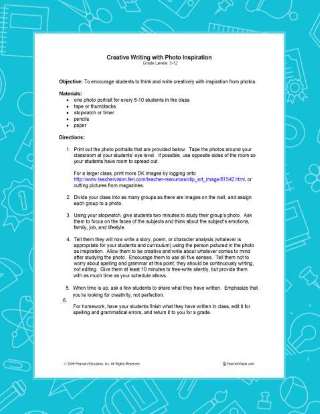
Reading Worksheets, Spelling, Grammar, Comprehension, Lesson Plans

8th Grade Writing
For eighth graders, this Common Core area helps students gain mastery of writing skills by working collaboratively and producing written texts, understanding syntax and vocabulary, and organizing their ideas. Among the complete standards for this grade, eighth graders will be asked to: support the claims of their arguments with evidence, logical reasoning, and credible sources, use a formal style when writing, be able to develop the topic of a work with details, facts, definitions, and quotations, employ formatting, graphics, and multimedia to present information in the written medium, employ narrative techniques like pacing, description, reflection, and dialogue to develop events and characters within a text, go through the process of writing, editing and revision for their written work, use appropriate technology to publish writing and to collaborate on written projects, demonstrate keyboarding skill, go through the process of writing, editing and revision for their written work, conduct short research projects to answer a question, quote or paraphrase the data and conclusions of supporting texts while avoiding plagiarism and using proper citation, use evidence from literary or informational texts to support analysis, reflection, and research.
Abraham Lincoln Bio Poem
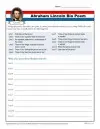
Your students will write a bio poem about Abraham Lincoln.
Bio Poem: My Mother
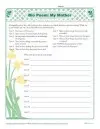
A fun Mother’s Day bio poem activity for your students!
Bio Poem: Pilgrim
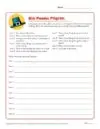
A biography poem, also called a bio poem, is a short poem which describes a person or thing. This printable Thanksgiving Activity guides students through creating a bio poem about Pilgrims.
Bio Poem: Someone You Know
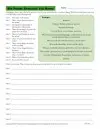
Students will write a bio poem about someone they know using the format set in this worksheet.
Christmas Tree Bio Poem
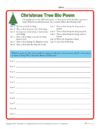
A biography poem, also called a bio poem, is a short poem which describes a person or thing. Sometimes writing a bio pem can be tricky! This printable Christmas Activity guides students through creating a bio poem about a Christmas tree.
Correct the Transition Words Mistakes – Worksheet
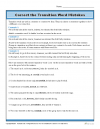
Have your students revise sentences and correct transition word mistakes with this educational writing activity.
Edgar Allan Poe: Secrets in Poetry
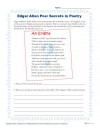
Students read from Edgar Allan Poe’s “An Enigma” and decipher the name of the woman’s whose name is hidden within the text.
Father’s Day Bio Poem: My Father
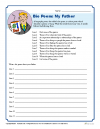
Enhance your students’ writing skills with this fun Father’s Day Biography Poem activity.
Fourth of July Bio Poem: America
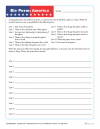
Encourage your students to learn about America with this Fourth of July Biography Poem activity.
George Washington Bio Poem
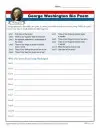
Your students will write a bio poem about George Washington.
George Washington’s List of Rules
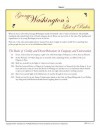
When George Washington was a young boy, he made a list of rules for himself. Students choose one of the rules and write what it means.
Halloween Bio Poem Activity: Ghost
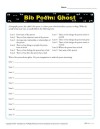
Create a bio poem about your own personal ghost with our fun Halloween printable activity!
Main Idea Organizer
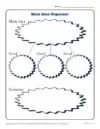
Teach your students how to organize their writing with this helpful Main Idea Organizer. Students will be asked to complete the worksheet by writing their own main idea, three details, and a summary. This will help your students better understand how to organize their ideas for writing in the future, especially when writing an essay!
Write a Biography Poem
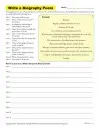
Bio poems are usually short poems following a specific format. In this worksheet students will write a bio poem about themself.
Bio Poem: A President
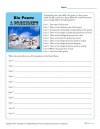
Bio poems are usually short poems following a specific format. Students will write about a President in this worksheet.
Bio Poem: An Ocean
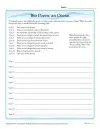
Have your students get creative by writing a bio poem about an ocean.
Editing and Proofing a Paragraph
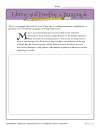
Your students will further their editing and proofing skills by correcting a paragraph in this printable classroom worksheet.
George Washington: Almost a King

What if George Washington had become king? Students ponder this question and then write about what it would be like.
How to Write a Thesis Statement
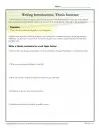
This activity helps students develop a strong thesis statement for their essays by providing practice writing sample statements.
How to Write an Introduction: Bridge Building Activity
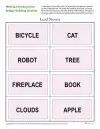
This activity is designed to help students learn about writing introductions through a fun bridge building activity to join the lead noun card and thesis statement card.
In this engaging and rigorous summer course, students study the how and why of academic essay writing.
Live instructors guide students (ages 14–16) as they plan, draft, and revise academic essays, and learn why such essays matter.
This course is recommended for students entering Grade 8, 9, or 10. We recommend that students enroll in Language Arts courses at grade level.
Academic Essay Writing offers an intensive study of the how and why of academic writing. Students learn how to plan, draft, and revise an academic essay — as well as why such essays matter.
Featuring the popular college writing textbook, They Say / I Say: The Moves That Matter in Academic Writing , the course approaches “the essay” as part of a larger conversation being held among scholars. The tools students gain in this course will help them enter into that conversation and maintain it through their academic careers.
Students must purchase the required book(s) before the start of the course.
Our instructors hold classes virtually, in a small-sized (10-16 students) videoconferencing classroom. With a small class size, teachers can give individualized attention to each student, providing real-time verbal and written feedback and supporting students' growth as writers.
Our Language Arts summer courses do not include homework. Students receive frequent feedback on their writing and present their work throughout the course.
If you drop a summer course before the start of your first class session, we'll issue a full refund for the course tuition. No refunds will be issued for withdrawing from a summer course after the start of your first class session. We do not accept Language Arts book returns, since they are purchased from a third party.
Our summer course offerings meet five days a week, Monday through Friday. We offer this course in two timing formats. Both cover the same course material.
- The two-week course meets for 3 hours each day.
- The four-week course meets for 1.5 hours each day.

All Formats
Resource types, all resource types.
- Rating Count
- Price (Ascending)
- Price (Descending)
- Most Recent
Free 8th grade writing-essays outlines
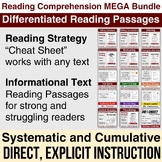
Reading Comprehension Strategies MEGA Bundle | Social Emotional Learning | ELA

End of Year Memory Book 1st 2nd 3rd 4th 5th Grade Last Week of School Activities
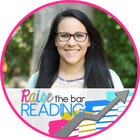
4th Grade End of Year Memory Book - End of Year Activities - Writing Prompts

ESSENTIAL Reading +Writing Anchor Charts Collection BUNDLE - Editable - Google
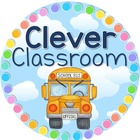
7th & 8th Grade ELA Worksheets. 156 Grammar Lessons & Reviews. 362 PAGES. BUNDLE

State Test Prep Reading Passages Worksheets Main Idea, Supporting Details | Fast
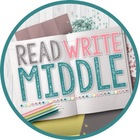
Reading Comprehension Passages and Questions ELA Test Prep Digital Resources
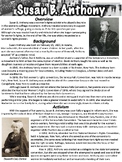
Susan B Anthony Worksheet

FREE Five Paragraph Essay Outline
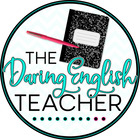
Persuasive Writing Graphic Organizer FREE

Venn Diagram Template with Lines

Digital Persuasive Essay Outline - Graphic Organizer for Google Docs OLC4O OSSLT

- Google Drive™ folder
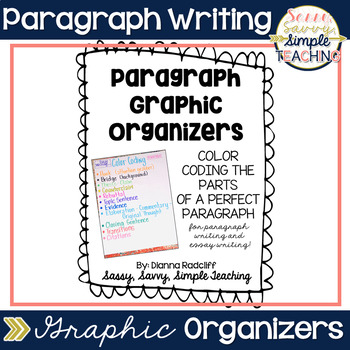
Paragraph Writing Graphic Organizers (Color Coding Strategy for Essay Writing)

Opinion Writing Graphic Organizer

Essay Checklist Explanatory/Informative Essay
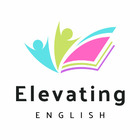
Argumentative Essay Graphic Organizer Rubrics FREE

Argument Essay Outline - Anchor Chart

- Word Document File
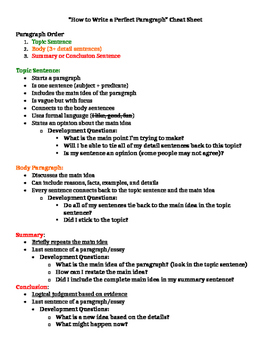
"How to Write a Paragraph" Cheat Sheet

Informational Pre-Writing Organizers
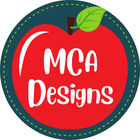
- Easel Activity
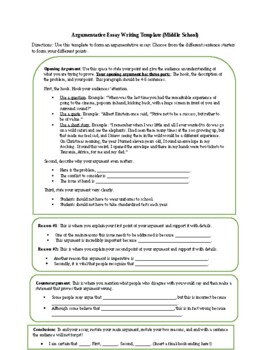
Argumentative Essay Template with Sentence Starters (Middle School)

Response to Literature Essay Frame

Persuasive Speech Planners [FREEBIE!]

Four Square Writing Graphic Organizer

R.A.C.E.S. Paragraph Writing Student Bookmarks FREE
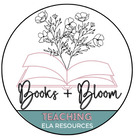
Essay Writing Organizer
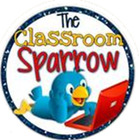
Self & Peer Editing Checklist for Argumentative/Persuasive Writing

Argumentative Essay Outline

Persuasive or Opinion Essay Graphic Organizer

The 5-Paragraph Persuasive Essay OUTLINE

Essay Planning Templates
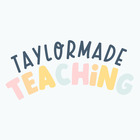
Compare/Contrast Graphic Organizer for Books and Movies

Opinion Writing Graphic Organizer DBQ - FREEBIE

- We're hiring
- Help & FAQ
- Privacy policy
- Student privacy
- Terms of service
- Tell us what you think

IMAGES
VIDEO
COMMENTS
The length of the 8th-grade essay slightly depends on the format and the particular type of writing. However, it varies from approximately 500 to 800 words. Within this framework, you have to make yourself clear and deliver all necessary points.
From expository writing prompts and narrative writing prompts (for narrative essays, perhaps) to creative writing prompts, your middle school students need not be overwhelmed with where to start — or take - their writing. Ok, that's all for today. Until next time, write on… If you enjoyed these New 8th Grade Writing Prompts,
These fun and interesting 8th-grade writing prompts will inspire older students to write longer and more in-depth work. ... Types of Writing; Essays; 100 Interesting 8th Grade Writing Prompts By Kate Miller-Wilson, B.A. , Staff Writer . Updated July 20, 2020 Image Credits.
August 31, 2022. homeworkhelp. Students. A grade 8 school student have to write many essays on different topics. Thankfully we have put together a list of 25 great essay topics to ease your task.
That means they need to have a vast vocabulary and use it effectively. Here are writing prompts to help your students hone their skills: 34. Write a news article about a recent natural disaster. 35. Think about a time when you were extremely proud of yourself. Write a first-person account of your proudest moment. 36.
Verbal has a double meaning for eighth grade writing: it refers to the oral presentations the kids will do and to this year's focus on grammar — gerunds, participles, and infinitives.. Argument essays. Written in formal language, argument essays should start with an introduction that clearly presents the writer's position and flows into a well-organized, research-backed argument that ...
Following you will find a collection of interesting writing prompts that make great writing assignments and activities for eighth-grade students. 1. Compose a poem about being in the 8th grade. 2. Write a story about becoming a famous Youtuber. 3. Share about a time when you didn't allow fear to overcome you.
Explore printable Essay Writing worksheets for 8th Grade Essay Writing worksheets for Grade 8 are an essential tool for teachers looking to develop and enhance their students' reading and writing skills. These worksheets focus on various aspects of writing, including nonfiction writing, which is a crucial component of the curriculum for this ...
Course Summary. Let us help you teach your 8th graders about writing, reading strategies and proofreading techniques with this engaging course, which adheres to Common Core State Standards. Our ...
In order to build reading skills, your 8th grader: Evaluates the evidence in texts to determine the strongest supports of an idea and analysis. Determines the main idea or theme of a text using evidence from the text to support it. Provides an objective summary of a text. Understands, summarizes, and tracks the progress of the main idea of a ...
The formatting guidelines for essay writing for Class 8 are as follows: Use a standard font such as Times New Roman or Arial, with a font size of 12. Use double spacing throughout the essay. Include a header on each page with the student's name, the title of the essay, and the page number.
A Letter to My Younger Self. Worksheet. Argument Writing Graphic Organizer: Solving Problems. Worksheet. Narrative Writing: Removing Irrelevant Details. Worksheet. Descriptive Writing: Picture Prompt #7. Worksheet. Writing With a Formal Tone.
31 8th Grade Writing Ideas. Writing Ideas for 8th Graders— Students of all ages can benefit from writing daily journals—but journaling is an especially beneficial activity for young teens in 8 th grade who are preparing to graduate fro middle school and enter high school. Use these new writing prompts for 8 th graders to help your class ...
Lesson Plan. Informational Essay: Creating an Outline for a Draft. Lesson Plan. Informational Essay: Prewriting With Research. Lesson Plan. Informational Essay: Getting Organized Before Writing. Lesson Plan. 1.
Building Vocabulary Using Word Roots and Prefix Meanings. During the lesson, students build their vocabulary by using word webs to help them learn the meanings of different Greek…. Browse our printable 8th Grade Language Arts and Writing Lesson Plans resources for your classroom. Download free today!
8th Grade Writing. For eighth graders, this Common Core area helps students gain mastery of writing skills by working collaboratively and producing written texts, understanding syntax and vocabulary, and organizing their ideas. Among the complete standards for this grade, eighth graders will be asked to: support the claims of their arguments ...
Live instructors guide students (ages 14-16) as they plan, draft, and revise academic essays, and learn why such essays matter. Academic Essay Writing. Grade. 8-10. Term. Summer. Length. 2 weeks or 4 weeks. Daily In-Class Time.
Essay Writing Class 8 Format, Examples, Topics, Exercises. An essay is, generally, a piece of writing that gives the authors own argument — but the definition is vague, overlapping with those of a paper, an article, a pamphlet, and a short story. Essays have traditionally been sub-classified as formal and informal.
Printable 8th Grade Writing Worksheets ... When writing an informational essay, start with gathering information with the help of this research graphic organizer template. 8th grade. Reading & Writing. Worksheet. Plan a Podcast Episode Graphic Organizer. Worksheet.
Step up to Writing Inspired Narrative Writing Bundle. The Resourceful Teacher. $16.00 $17.79. 7th & 8th Grade ELA Worksheets. 156 Grammar Lessons & Reviews. 362 PAGES. BUNDLE. Sarah Jayne's Store. $38.00 $48.48. MS & HS Science Labs, Activities, STEM Challenges, & Web Quests (Growing Bundle) Midwest Science.
Grade 8 2022 B.E.S.T. Writing. Writing Prompt. Write an argumentative essay about whether facial recognition technology is beneficial or harmful. Your argumentative essay must be based on this prompt and topic, and it must incorporate ideas and evidence found in the sources provided. Use your best writing to complete an essay that
Informational Essay: Editing. Students will have the opportunity to strengthen their informational essay drafts by correcting errors in conventions and mechanics. They'll use a checklist to guide this critical step in the writing process. Browse 8th Grade Writing Process Lesson Plans. Award winning educational materials designed to help kids ...
The purpose of these sample test materials is to orient teachers and students to the appearance of passages and prompts on paper-based accommodated. B.E.S.T. Writing tests. Each spring, students in grades 4-10 are administered one text-based writing prompt for the B.E.S.T. Writing test. Students will respond to either an expository prompt or ...